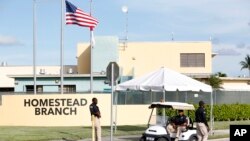Mexico's foreign minister Luis Videgaray on Tuesday called the separation of children from immigrant parents at the U.S.-Mexico border "cruel and inhumane" and urged the United States to reconsider the practice.
Images published this week of children and youths sitting in concrete-floored cages in U.S. shelter facilities have stirred outrage. U.S. officials have defended the measures as a way to secure the border and deter illegal entry.
"This is a clear violation of human rights and puts children, including those with disabilities, in a vulnerable situation," Videgaray told a news conference in Mexico City.
Videgaray said the Mexican government had made its position clear to U.S. President Donald Trump's administration and raised the issue with senior U.N. officials, including U.N.Secretary-General Antonio Guterres.
Of some 1,995 cases registered by U.S. authorities, only around one percent of the children affected were Mexican, and most had already been repatriated, Videgaray said.
Among the 21 identified cases of Mexicans separated from their parents was a 10 year-old girl with Down Syndrome who was being held in McAllen, Texas, Videgaray said. The children are being held in shelters managed by the Office of Refugee Resettlement, a division of the Department of Health and Human Services.
The girl's mother was sent to another place, Videgaray said.
U.S. Attorney General Jeff Sessions announced a "zero tolerance" policy in April that all immigrants apprehended while crossing the U.S.-Mexico border illegally should be criminally prosecuted under the country's criminal entry statute.
The policy has led to family separations because when border agents refer apprehended migrants to court for prosecution, parents are held in federal jail to await trial by a judge while the children either remain in border patrol custody or are moved into facilities.
Most of the children are from Central America, especially Guatemala, Honduras and El Salvador.
Honduras on Monday called for the United States to end the separations, and El Salvador said the policy puts children's health at risk and could cause psychological scars. Videgaray said Mexico would be working closely with the Central American governments.
Tensions have run high between Mexico and the United States over the shared frontier ever since Trump ran for office vowing to build a border wall to keep out illegal immigrants.





